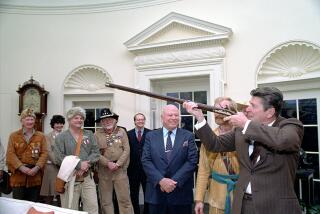NONFICTION : THE GREAT DEPRESSION by John A. Garraty (Harcourt Brace Jovanovich: $17.95; 249 pp.).
- Share via
The West’s political leaders and economists were burdened by no surplus of wisdom in their efforts to deal with the Depression, we learn in this examination of the principle economic calamity of the century.
Like the French commentator who dismissed Wall Street’s crash as the mere “lancing” of a speculative “abcess,” Western leaders and economic crystal-gazers first refused to acknowledge the crisis. Then each nation tended to blame its neighbors; none would really cooperate to end it. Politicians and leading economists also wouldn’t admit--until recovery was under way--that their inheritance of hoary laissez-faire notions offered no solution. Curiously, even as governments undertook huge public-spending programs, their leaders scoffed at the “pump-priming” theories of John Maynard Keynes.
The emphasis here is on ideas, and John Garraty, who is chairman of the Columbia University history department, provides a thorough, understandable survey. But his account fails to convey the desperate importance of the theorizing by offering too few details of the Depression’s crushing effects on the population. We glimpse only too faintly the nearly abandoned Midwest farm towns, snaking bread lines, plush Pullman cars without a single passenger.
Nor does Garraty fully satisfy us in explaining the causes of the Depression. We discover the views of powerful and learned contemporaries--President Hoover, Treasury Secretary Andrew Mellon, sundry economists, Laborites and Marxists. But what does Prof. Garraty believe? What are we to believe? We leave the table hungry.
More to Read
Sign up for our Book Club newsletter
Get the latest news, events and more from the Los Angeles Times Book Club, and help us get L.A. reading and talking.
You may occasionally receive promotional content from the Los Angeles Times.











